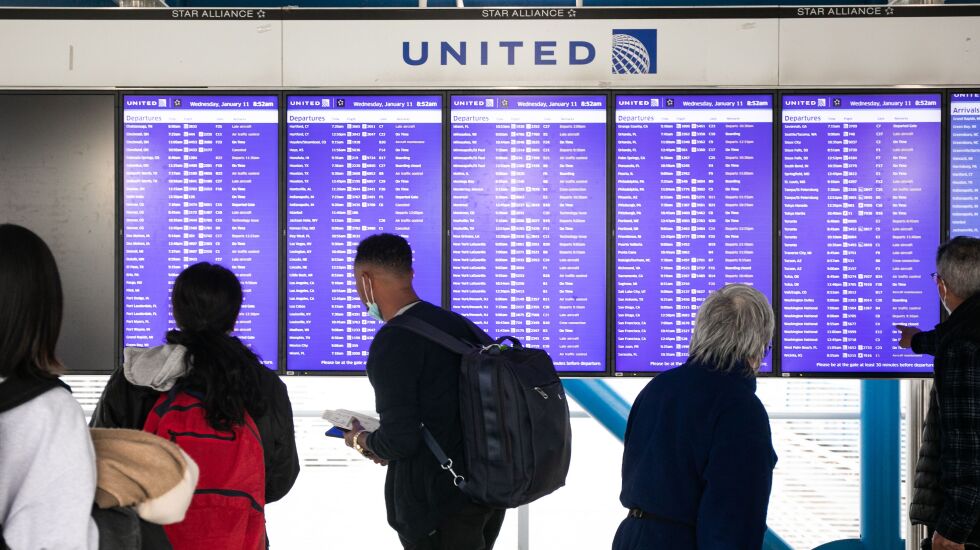
There was something refreshing about 2023, even with the troubles around the globe and in our national affairs. It was a year without a stultifying pandemic pall hanging over the news and daily lives.
The coronavirus remains with us, but at least many routines looked familiar. Air travel surged, hotel and convention business picked up, and people were back in stores. Offices are still downsizing as remote work becomes ingrained, but the return to normalcy qualifies for an honorary mention as a top story of the year in Chicago business.
Others also come to mind as we prepare an auld-lang-syne sendoff for the passing year. Here’s a list of the biggest stories and topics crossing the Money desk in 2023, in reverse order and 100% subjective, just like internet clickbait.
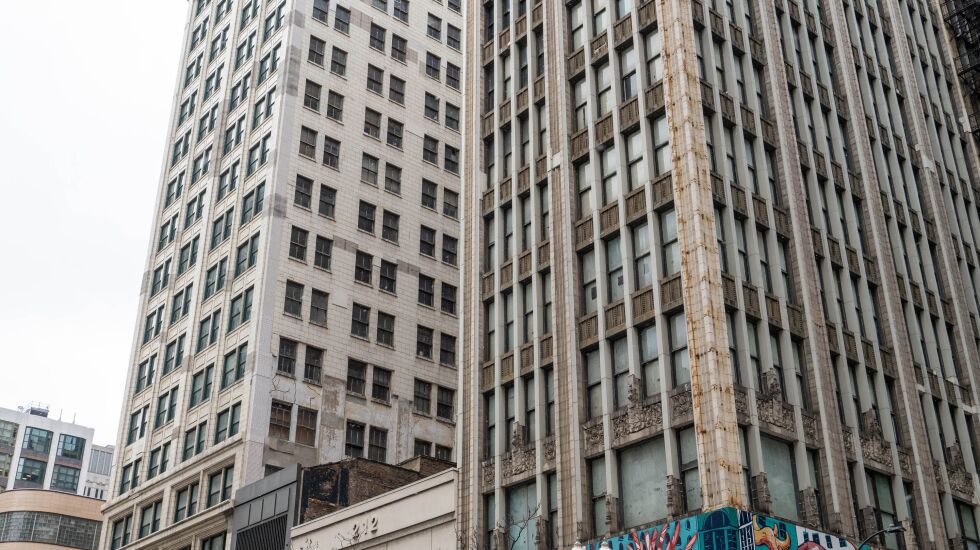
No. 10 — Fates on State. Following December action by the Commission on Chicago Landmarks, the Chicago City Council is poised to recognize the early 20th century towers at 202 and 220 S. State St. as worthy of protection. It’ll set up a stare down over whether the federally-owned buildings will be condemned for a security need identified by federal courts.
Preservationists and downtown business interests are allied in the cause of saving the buildings. They don’t want to see a dead zone created on the historic street. It’s now up to federal officials to explain why demolition that opens the nearby Dirksen Federal Building to more views is a security improvement.
No. 9 — Terminal shock. The biggest airlines at O’Hare — United and American — are objecting to the costs of a new global terminal after hearing from the city that the project is now $1.5 billion, or 24%, over budget before work has even started. This looms as a major test for Mayor Brandon Johnson.
Talks are expected to intensify next year, with the city holding a legal ace: It can press the airlines to honor the contract they signed in 2018. But the airlines hold their own cards when it comes to local hiring and investment. City officials know United is expanding heavily in Denver and that Chicago jobs could migrate. Belt-tightening may be in order for a terminal design from Chicago architect Jeanne Gang.
No. 8 — Campus conundrum. The year saw news in the suburbs dealing with real estate’s version of a white elephant — sprawling, lush corporate campuses nobody wants anymore. The former Sears Roebuck headquarters in Hoffman Estates was sold to a data center developer. Not far from that site, a former AT&T research center is being refashioned into a general office and residential property, with aspirations for an urban vibe.
Trouble looms, however. Baxter International wanted to unload its Deerfield campus to a buyer suspected of wanting to put up warehouses. Opposition ensued, the deal was canceled, and Baxter now says it is staying. Similar office-to-warehouse work is under way at the former Allstate site in Glenview. Recent data show the warehouse boom is losing momentum. Amazon, a heavy player in this sector, is cutting back on space.
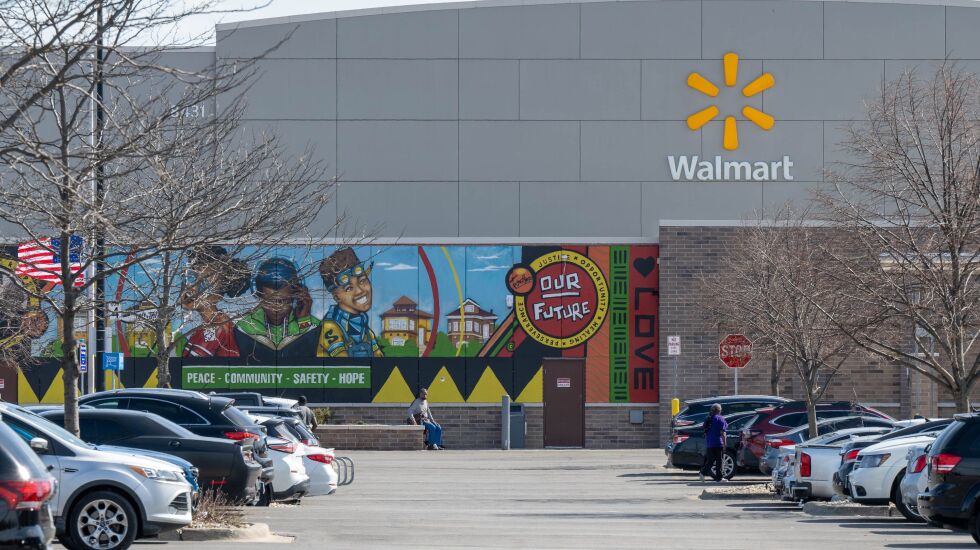
No. 7 — Been good to know ya. Old Navy shut its store on State Street during 2023. Over on the Magnificent Mile, the Signature Room closed near the top of 875 N. Michigan Ave., or what Chicagoans still call the Hancock building. The closure surprised diners and the restaurant’s own workers.
But nothing hurt the civic pride as much as Walmart closing four Chicago stores, three of them on the South and West sides that need retail and grocery outlets. Another loss that hit some Chicagoans: Harris Bank and its Hubert the Harris Lion mascot are no more. It’s all BMO Bank now. Sorry, no plush toy for the kids.
No. 6 — Keeping up appearances. Higher interest rates and declining foot traffic in many places haven’t made things easy for downtown real estate, but Fulton Market and the Near West Side remained active. The opening of the Chan Zuckerberg Biohub Chicago, funded by the first couple of Meta, has certified the neighborhood as having tech innovation appeal. And if the workers get thirsty, there’s now a Guinness taproom nearby.
Elsewhere downtown, megadeals are inching forward. Developer Sterling Bay needs new partners for Lincoln Yards, a decade-long investment. But at the long-dormant development site at 400 N. Lake Shore Drive, developer Related Midwest has started to move dirt for the first of two residential towers. The property years ago was slated for a Chicago Spire that would have been the tallest building in the Western Hemisphere.
No. 5 — Homefront battle. It was a tough year to be a Realtor. First, volumes of home sales were down because of a lack of sellers. People with low-interest mortgages tended to stay put. Then, the Chicago-based National Association of Realtors came under fire amid allegations from staffers that it allowed a “toxic culture” of sexual harassment. Its longtime CEO quit.
Then came the topper: a federal court verdict the association and major brokerages owed $1.8 billion in damages over commissions a jury said were inflated. Appeals are likely, and an NAR spokesperson said the case “is not close to being final.” But it could lead to drastic changes in who pays for a Realtor’s work.
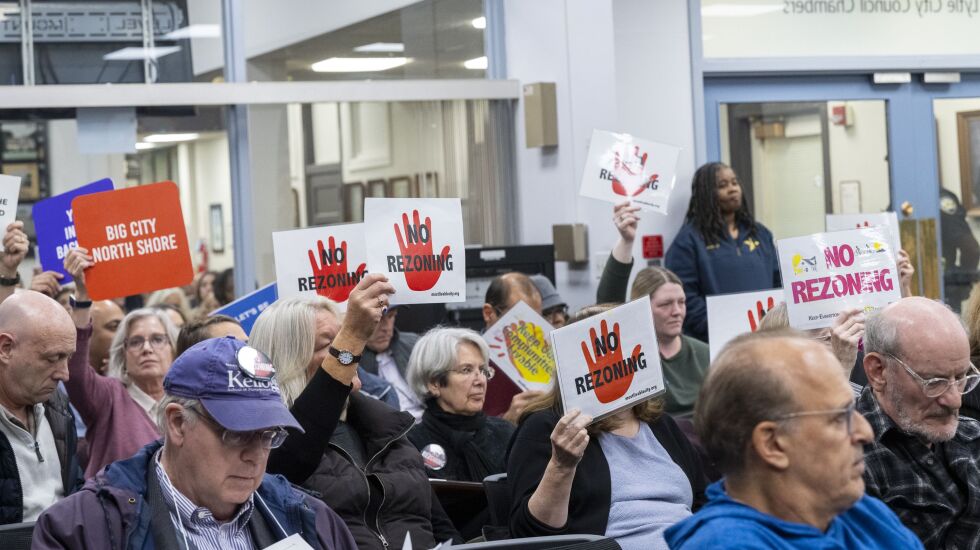
No. 4 — Grit on the gridiron. In Evanston, football with a side hustle of concerts narrowly won approval. In a 5-4 vote, with the mayor casting the tiebreaker, the City Council there approved Northwestern University’s plan to rebuild Ryan Field for the Big Ten’s Wildcats and to let it hold outdoor concerts near quiet single-family homes. But the matter is likely to be tied up, as opponents already have sued over what they called a “backroom deal.”
Contrast that with the Chicago Bears. Facing a stout defense by taxpayers in Arlington Heights, the team has changed its game plan and opened dialogue with Chicago Mayor Brandon Johnson. Soldier Field isn’t finished yet.
No. 3 — Furnace flareup. This is a latecomer, but it had to make the list. U.S. Steel announced Dec. 18 it will be acquired by Nippon Steel for more than $14 billion. If completed, the deal could have implications for jobs in Northwest Indiana. U.S. Steel employs more than 4,300 people at its Gary Works. Nippon could favor lower-costs locales.
The United Steelworkers union has assailed the deal, which needs approval from shareholders. Federal regulators also will review the sale to decide if a steel takeover by a Japanese company threatens national security. Members of Congress are blasting the deal but may be powerless to stop it.
No. 2 — La Salle squall. City Hall advanced plans in 2023 to use tax subsidies to help developers revive old office buildings near the La Salle Street corridor. Five such projects got tentative approval. But a new administration was elected and now all bets are off, with the mayor possibly tapping the available funds for other uses, such as avoiding general tax increases.
La Salle and its canyon of old-style office buildings symbolize the problems facing the core business district. While the mayor weighs his decision, others count on Google’s ongoing work at the Thompson Center, La Salle and Randolph street, to make downtown trendy again.
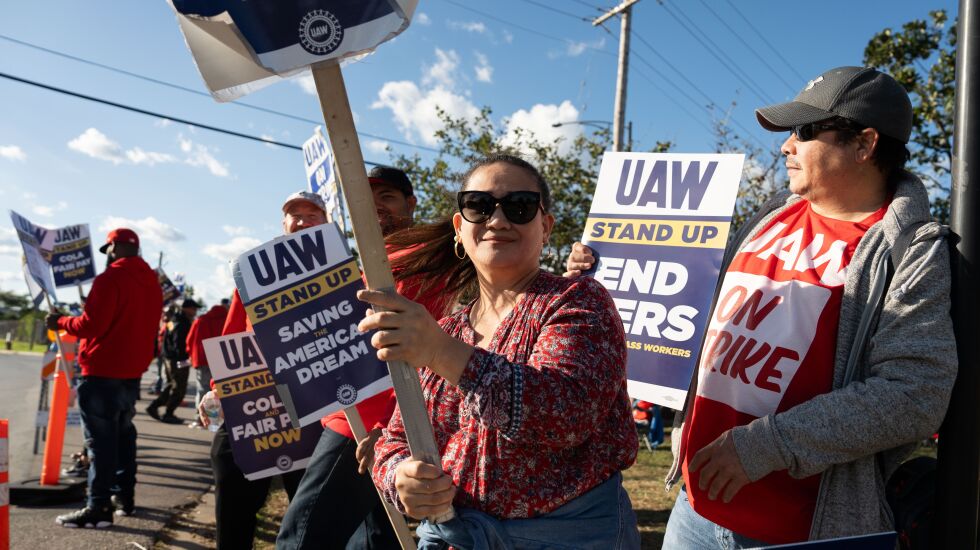
No. 1 — UAW on the march. There have been many examples of activism in organized labor, but none as compelling as the United Auto Workers union and its surgical strikes against plants of the Detroit Three automakers, including Chicago’s Ford factory.
The roughly 1 1⁄2 month walkouts produced historic wins for the union, including wage hikes of at least 33% during the contracts’ four-and-a-half years. At Stellantis, the deal calls for reopening the plant at Belvidere. The contracts are so strong as to inspire organizing at other manufacturers.
Union leadership used a sense of mission to mobilize members. UAW President Shawn Fain employed the language of a preacher, talking about the “righteous” cause of the working class. Other unions could mimic the passionate pragmatism.
One more thing about 2023, which I add here as a favorite. The Sun-Times celebrated its 75th birthday. Hale and hearty now with support from major foundations, it’s still spry after years of peril, a Chicago survivor.
So much for reminiscing. A presidential election in 2024 has a major-party candidate who recycles Nazi rhetoric and promises retribution. He leads in the polls. Next year, the Sun-Times again will have much to do.







